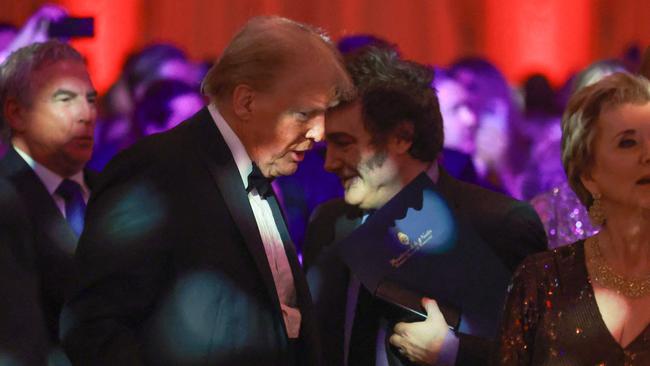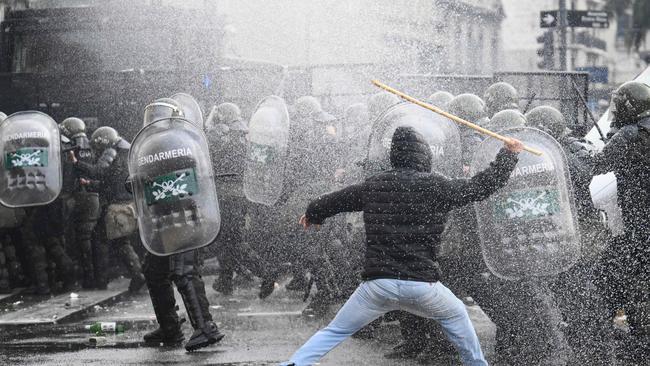Javier Milei is pulling Argentina back from the brink – Australia should take note
The eccentric President, Javier Milei, is slashing spending and bureaucracy – but can he pull Argentina safely from the economic mire?

Javier Milei became the President of Argentina a year ago. He has set out to transform the volatile and underperforming Argentinian economy. He declared he would take a chainsaw to the bloated national public service and has begun doing just that. Flamboyant and eccentric, he resembles several of the leaders who have risen to the top of democratic states in recent years. Boris Johnson is one who springs to mind.
Will he succeed where Johnson failed? What should be the criteria of success? Argentina’s political and economic history, since 1930, has been one of coups, cronyism, poor macro-economic policy choices, corrupt populism, recurrent hyperinflation and repeated defaults on foreign debt. Various efforts to fix all this at source have foundered. In the late 20th century there was an attempt at liberal reform, but it ended in a debacle.
The crisis that hit a liberalising Argentina in 2001-02 has often been cited as an empirical refutation of neoliberalism, not least by Nobel laureate economist Joseph Stiglitz in his book Globalism and Its Discontents (2002).
Moreover, it has been widely alleged, since the 2008 crisis in the US that triggered the global financial crisis, that neoliberalism (the lack of regulation of markets, in particular) was to blame and was thus definitively discredited.
So, in assessing Milei we must do two things: define neoliberalism and take a look at the background to the 2001-02 crisis in Argentina.
Neo-liberalism is generally traced to the work of Ludwig von Mises, Friedrich Hayek and Milton Friedman that came to the fore as stagflation hit the Western social democracies in the 1970s. But a succinct way to summarise it was offered by British economist John Williamson in 1989 in what he dubbed “the Washington Consensus”. Succinctly put, the Washington Consensus called for any economy that wanted to flourish in a competitive world to do eight key things:
• Liberalise trade by reducing trade restrictions and tariffs.
• Privatise state-owned firms to increase efficiency and profitability, and eliminate state subsidies.
• Remove regulations that prevent new firms from entering the market.
• Minimise deficit spending.
• Minimise inflation through sound monetary policy.
• Protect property rights.
• Promote foreign investment to create jobs and build skills.
• Promote a competitive exchange rate to help exports.
These are radical steps to take if you run a sluggish, protectionist, big-spending government whose politicians depend on corruption and patronage to win or retain office. But they are sound common sense if you want growth and prosperity. The trick lies in getting the sequence and interaction of such reforms right and building a social coalition around pushing them through.
If you don’t know exactly what you are doing and fail to calibrate the reforms, bringing the electorate along with you, including those most likely to be disadvantaged, at least in the short term, you run the risk of things coming off the rails.
Milei runs this risk, if only because he is so flamboyant in manner and truculent towards critics.

Let’s get economic liberalism in perspective, here and elsewhere.
Here in Australia, as Ian McLean showed in Why Australia Prospered: The Shifting Sources of Economic Growth (2013), we have, in general, managed such reforms with an effectiveness and consensus way ahead of anything achieved in Latin America or much of the rest of the world.
It could have been otherwise. And if we don’t watch ourselves, we could fall away.
Gough Whitlam, between late 1972 and late 1975, badly mishandled the economy. He paid the price by being swept from office emphatically, then trounced a second time in 1977. Bob Hawke, in the 1980s, grasped the nettle and built the coalition that got much of this done here – with bipartisan support from the Coalition.
Liberal reform under Bob Hawke, Paul Keating (who as prime minister oversaw “the recession we had to have”), Prime Minister John Howard and his treasurer, Peter Costello, served us exceptionally well.
The Australian economy rode out the Asian financial crisis of the late ’90s, delivered a generation of uninterrupted growth and transformed us from what Singaporean politician Lee Kuan Yew had derided as the “poor white trash of Asia” into what even he conceded was “a miracle economy”.
Yet all this was denounced by the unappeasable left as “Howard’s brutopia”. Reform ran out of steam. We’ve now had 1½ decades of retreat from liberal reform and fiscal discipline. Under Anthony Albanese we have an ALP government committed to extravagant spending. Jim Chalmers calls this a better form of capitalism.
It isn’t. It is (as it is in ALP-governed Victoria) a tax and spend, or borrow and binge, ideology that undermines reform and sound investment. We are floundering economically and the upcoming federal election almost certainly will turn on debates regarding economic performance and management.
In Latin America, the only sustained successes for liberal reform since the 1970s have been Chile and the Dominican Republic; and the latter, though impressive, is very small. Chile is controversial because the reform agenda was pushed through by a harsh military dictator, Augusto Pinochet (1973-89).
Also, the global left was and has remained ideologically pro-socialist and sentimental about the communist Salvador Allende, whom Pinochet overthrew in a bloody coup. Allende’s was a very different vision for Chile. But the liberal reforms worked and have been upheld by the subsequent, democratic governments of the country.
Liberal reforms were attempted in Venezuela under Carlos Andres Perez (1988-93) and Rafael Caldera (1993-98), but they were mishandled and the blowback catapulted Hugo Chavez into power, with his agenda of “Bolivarian socialism for the 21st century”. Chavez proved extraordinarily profligate and subverted Venezuelan democratic and economic institutions.
Yet, because of the countless oil billions Chavez lavished on spendthrift domestic and foreign aid programs, he and his successor, Nicolas Maduro, were lionised by the global left.
Their policies, in fact, have been ruinous for Venezuela. Apart from anything else, the country has piled up foreign debt, made a mess of its once-thriving oil industry, increased poverty, seen inflation run out of control, and overseen soaring violent crime and unchecked corruption. Nonetheless, as Michael Reid, then editor of the American edition of The Economist, based in London, showed in Forgotten Continent: The Battle for Latin America’s Soul (Yale University Press, 2007), despite the burden of postcolonial ideologies and statist impulses, the continent has been stumbling towards democratic and market reforms for decades. The successes and failures warrant a close attention they seldom get.
For, as James Robinson and Daron Acemoglu point out in The Narrow Corridor: States, Societies and the Fate of Liberty (2019), the work for which they won the Nobel Prize in Economic Sciences in 2024, achieving such things is neither natural nor easy, or a one-off task. We all need to take their teaching to heart.

In Argentina, right now, Milei would do well to pay attention to their work – and the real lessons of 2001-02. He is an economist. He ought to be able, therefore, to comprehend their arguments. Above all, his whole program and the future of his country are at stake.
However, he is a wildly eccentric character and his cognitive style may well not lend itself to the necessary analytic rigour or policy discipline. We shall see.
Sebastian Edwards, in Left Behind: Latin America and the False Promise of Populism (University of Chicago Press, 2010), nailed the matter in case after case. As he remarked: “In 1700, the colonies of North and South America had roughly the same standard of living. By 1820, however, income per capita in Latin America was about two-thirds that of the United States and Canada. And in 2009 Latin America’s income per person was roughly one-fifth that of North America.”
He set out, in his book, to study the attempts by various countries (Mexico, Chile, Venezuela and Argentina) in the Southern Cone, since the 1970s, under the Washington Consensus, to modernise their economic and political institutions; to break free, if they could, “from the vicious circle of economic mediocrity, crises, inflation, poverty and authoritarian regimes”. His dissection of what went wrong in Argentina is especially important to register as Milei sets about taking his policy chainsaw to the deficiencies that hobble his country.
For, as Edwards wrote 1½ decades ago: “In many ways, Argentina epitomises Latin America’s historical proclivity toward macroeconomic instability, trade imbalances and costly crises.”
The foreign debt default and currency crisis it underwent in 2001-02, with its consequences, he observes, “has become one of the most important arguments against globalisation, market reforms and so-called neo-liberalism”. Washington has been blamed, the International Monetary Fund has been blamed, capitalism has been blamed, but the fault lay with the poor handling of policy and reform by Argentina’s own government. It’s vital to understand this.
Argentina has a long history of defaulting on its foreign debt and suffering currency crises. For 200 years it has been plagued by currency failures and unsuccessful attempts to control inflation. It was in a state of debt default or debt restructuring for one in four years between 1826 and 1999. Twice in the 1980s attempts were made to curb inflation through monetary policy, but each was undermined by unregenerate government fiscal profligacy. The outcome in 1989 was a bout of hyperinflation, in which inflation reached 3000 per cent a year.
It was against this dismal background of economic mismanagement that in 1991 president Carlos Menem pegged the Argentine peso to the US dollar.
The idea was developed by a Harvard-trained Argentinian economist called Domingo Cavallo. The idea, Edwards explained, was that the government would not be permitted, under law, to borrow any money from the central bank or expand liquidity unless the expansion was fully backed by foreign exchange reserves.
This kind of thing, our historian related, had been tried before, but the government had always broken discipline.

This time, to begin with, the policy worked. Inflation dropped from 2000 per cent in 1990 to barely 3 per cent in 1995 and economic growth surged: by 11 per cent in 1991, 10 per cent in 1992, 6 per cent in 1993 and 8 per cent in 1994. The most vocal opponents of the reforms were public sector employees and state-owned companies because the reforms adversely affected state subsidies to them. Crucial to the crisis that then unfolded was the fact this reform was implemented while several other reforms recommended under the Washington Consensus were neglected. There were still large budgetary deficits, there was a lot of rigidity in the labour market and Argentina remained a relatively protectionist and closed economy.
In other words, far from being set up for a fall by the imposition of the Washington Consensus, Argentina was riding for a fall because it violated basic principles of the Washington Consensus – see items one, two, four, seven and eight above.
Throughout the decade, deficits averaged about 4 per cent of GDP. Note, in passing, that the US federal budget deficit in 2023 was 6.3 per cent of its (gigantic) GDP. But the US has the world’s reserve currency and has been able to ignore alarm bells for many years. Argentina, in 1999-2000, had its own currency pegged to the US dollar and ignored explicit IMF and World Bank warnings that, in Edwards’ words, its “lax fiscal policy was almost suicidal in a country with a rigid exchange rate”.
The Argentinians undertook to mend their fiscal ways but never found it politically convenient to do so. Then, as elections approached, in 1999, Menem, for political reasons unhinged from fiscal policy, increased expenditures dramatically. Something had to give – and it did. How was it that Stiglitz failed to understand cause and effect here, in writing about the matter a couple of years later? It’s not rocket science.
And Milei will have to be a better fiscal manager than Menem, if he is to avoid some similar crash-and-burn scenario.
What Stiglitz, in fact, argued was that Argentina fell victim to the flow-on effects of crises elsewhere in the world, in the late ’90s: in particular, the Asian financial crisis and the Russian debt default.
Edwards pointed out, however, that Argentina’s problem was not these shocks themselves but the exposed state in which it was left by its own economic policy settings. Australia rode out those same crises precisely because it had undertaken a more thorough set of liberal reforms in the ’80s and ’90s, above all floating the Australian dollar.

What, then, is Milei – whose Argentine nickname is El Loco (the Crazy One) and who has been described as a combination of rock star and Tantric sex instructor – actually doing?
On June 27, 2024, Argentina’s congress passed Argentine Law No. 27,742. It was heralded as a law to serve as the basis and starting point for the liberty of the Argentinian people. Its Spanish language nickname is “Ley Bases”. It includes a series of basic reforms designed to kickstart deregulation and cut federal government spending.
A separate law introduced tax reforms, authorised privatisation of several government-owned entities and offered incentives to foreign investors. It also set about creating more flexibility in the labour market, authorised the renegotiation of some public infrastructure contracts and proposed regulatory reform in the energy sector.
Crucially, but dangerously, Ley Bases declared a public emergency that handed the Milei government sweeping powers for one year – until late June 2025 – that allow it to reshape, downsize and reform the federal government bureaucracies, create procedures to ensure budgetary transparency and find means to bring the budget itself back into balance. That’s a sweeping mandate. What’s not clear is how programmatically it adheres to the Washington Consensus – and, if not, why not.
So, how might El Loco come to grief? He is a “minarchist” – a disciple of Hayek or Robert Nozick, who believes in a minimal state – or “anarcho-capitalist”. The Washington Consensus is not anarcho-capitalist. He could make policy blunders. His party, La Libertad Avanza, holds only a narrow majority in both chambers of the national congress. So, he could lose political support – then improvise, like Menem in 1999.

He certainly set to work quickly at eliminating deficit spending, cutting outlays and taking a chainsaw to the national public service.
Twenty per cent of the bureaucrats have been laid off, which on paper has generated an instant $US20bn ($32bn) dividend. This included slashing Argentina’s equivalent of the Australian Taxation Office, terminating 3000 jobs.
Milei has brought inflation under appreciable control, at least temporarily. He also has freed up the housing market, with the result that the supply of rental properties reportedly has trebled in 12 months. All this looks promising as far as it goes. But so did Menem’s reforms in the ’90s.
Chainsaws are one thing. Coherent, disciplined policy is quite another. As we enter 2025, for both historical and contemporary reasons, what is happening in Argentina warrants sustained attention. Liberal reform is needed across Latin America – as it is in China, the US, the EU and Australia. Common prosperity depends on it.
Paul Monk is a fellow of the Institute for Law and Strategy (New York and London) and a long-time consultant in applied cognitive science. He is a former senior intelligence analyst and the author of a dozen books.




To join the conversation, please log in. Don't have an account? Register
Join the conversation, you are commenting as Logout